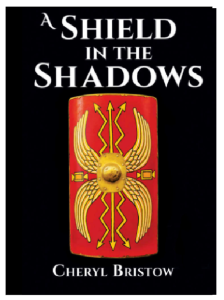 A Shield in the Shadows
A Shield in the Shadows
Cheryl Bristow
If you are a student of history, a Latin scholar, are curious about Roman times, this is your book. It carries you into the past on winged and entertaining feet. This book is an epic, enthralling and entertaining trip, engaging and captivating with every verbal step.
Synopsis
Early in the 5th century, the Roman empire is in its death throes. The barbarians are storming their gates. Huns, Goths, Slavs, Gauls encroaching or outright attacking the northern and eastern borders of the empire, all with the same goal, to defeat the Romans and take away their rich, prized lands. A Hun attack on a Christian village has unintended consequences. Tribes previously intimidated by Rome’s military reputation now decide to do the unthinkable: attack the Roman empire.
Theona, the female protagonist of the story’s romantic duo, and her father, a Christian pastor, are members of the Goth tribe. Father and daughter, Christian pacifists, are snared by the Gothic mob intent on the invasion of the Roman empire.
On the other side, Roderic, the male counterpart of the duo, becomes a traitor to his barbarian forefathers when he ultimately defects to the Romans.
Balancing this unfolding love story is the conflict between the eager-to-do-battle Gothic king, Radagaisus, an adherent of the old pagan gods embattled with his own people over their growing conversion to Christianity. Radagaisus’ anger and bitterness with Rome’s growing tolerance and acceptance of Christianity are flamed by his greed and impassioned covetousness for the affluent territories across the Danube.
The Roman protagonist, Marius, a nobleman’s son befriends the son of a famed Roman general and the two young men are thrust on to the battlefield much too early for their ages.
The barbarians’ belief and overconfidence that the Roman empire’s days are numbered, its might in decline is premature to their unexpected, and surprisingly unmilitaristic defeat.
Theona, our romantic heroine is mired in the throes of her own emotional turmoil. She is the besotted prize of opposing military leaders, one Roman, Marius, the other a Goth, Roderic.
Much in the way old westerns end riding off into the sunset, Theona rides off on the road to Rome with hopes and dreams that her future will be fulfilled by love and peace.
Richard says
We bestow on you, Cheryl Bristow, the title, “Marcia Aurelia Shakespeare, Lady of Ancient Literature.”
Bristow deserves the highest marks for the epic of this magnitude. It is a treasure trove of historical research and a jewelled crown of late Roman era romance.
The reader is increasingly engaged as the tumultuous turbulence of a war story unfolds. The conflict grows but not in the cliched ways of modern wars. The drama here unfolds on an unexpected stage that no reader expects, nor imagines.
Theona (our Juliet) awaits her lover held off stage, longer and longer, to build the suspense and to keep the reader guessing. Yes, it could happen; no, it can’t. Yes, Theona may pull it off; no, religious roots will conquer emotional urges. The unfolding yin and yang of the romance is captivating.
Bristow plucks the cliched strings of a historical symphony: cruelty and compassion, barbarism and kindness, slavery and freedom. The story intensifies with conflict: nationalism and race, religious factions, the old ways against the new. Bristow conducts a symphony like a verbal ode to joy. The flames of the story are fueled with increasing excitement, intensity and energy: feuding families, feuding generations, feuding armies, and feuding suitors.
The book surprises the reader with its suspense and energized tensions. Who’d have thought the era could have such fury and force. The intensity of the story is relentless in its development. Even when it looks like we might be sinking into the doldrums caused by a prolonged siege, Bristow stabs the accelerator again using the dog, Gideon, to revitalize the joy and happiness only a dog can deliver.
Rather than dwell on minor criticisms, a work of this richness and magnitude deserves unmitigated praise and recognition. Criticisms would be quibbling, nitpicking at a majestic throne of a masterfully written opus.
Bristow, we bow to your creative power, milady!





